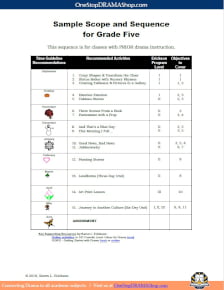A teacher recently posed a question to me regarding assessing student participation in class.
“What is the best way to get students to speak up in class and how should that be evaluated?”
A fellow colleague recommended that he should score students on the number of times they spoke in class discussion per week. This troubled him as he had at two students with special needs who didn’t always feel safe in talking in front of all their peers and they hardly ever raised their hands to volunteer during reflection or critique time. He did mention that the students were always eager and felt safe participating in the drama experiences. The instructor was feeling uneasy about counting the number of times a student spoke in class discussion as a part of his grading process.
I asked about the general purpose for this speaking requirement: was there something in his state or the national core art standards that he felt required students to participate in class discussion? Was there a school policy of some type? Had he seen the policy and discussed it with others? My questions included:
- Was this practice to encourage more speaking in class to meet standards? Which standards? Perhaps he could think about stretching student work beyond non-vocal activities such as pantomime or tableau in order to add a richer speaking oral environment. In drama, the opportunities to speak can be delivered through choral work, monologues, dialogue, storytelling, poetry reading. Opportunities can also be created through think pair share and small group discussions for reflection and critique.
- Was this to ascertain drama knowledge? If so, is there a rubric for this knowledge? Does he share the rubric with the students? There are other ways to uncover what a student knows, especially from reluctant speakers: exit tickets, quick writes, journals, and simple quick multiple choice or fill in the blank questions.
Students come into class with differing abilities and some are timid and reluctant to raise their hand in full class discussions even though they have the knowledge. How do we advantage the student and make sure our classroom grading procedures are fair to the introverted student as well as the extroverted one.
Some recommendations:
First, know specifically what knowledge or skill is to be assessed based on a state or national standards. Can this standard be written in an objective that can be given to the student and/or parent?
Second, if there is a school wide requirement for student classroom participation in discussion, can an argument be made for the participation that is inherent in the art form and can be scored through an observation check list? Teachers in many subjects rely on class discussion as a means to ascertain student involvement with the subject, but teachers in drama can observe the full physical and mental involvement with the content through their drama activities.
Third, sometimes what is easy to assess, like speaking once or twice, does not make it essential learning. Isn’t the quality and accuracy of what is said more important? If we take a hard look at what is essential to be graded and evaluated, we might find better ways of gathering the information we seek to give us substantial information about student learning.
I am anxious to see how this teacher resolves his question. In all cases of assessment and grading we must advantage the student above all else.











